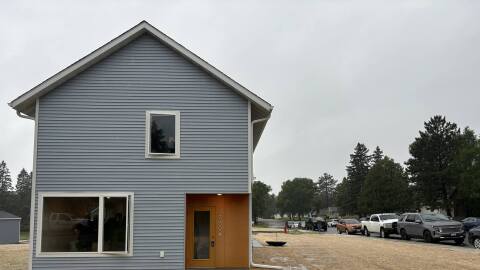ST. PAUL — Minnesota Lawmakers will gavel in at 10 a.m. Monday, June 9, to begin a 21-hour-long mad dash to pass bills that fund state government for the next two years, including everything from schools to parks to services for people with disabilities.
The Legislature adjourned on May 19 without finishing a budget, which is required to avoid a partial state government shutdown on July 1.
Democrats and Republicans share control of the House, while Democrats hold a one-seat majority in the Senate, so every bill has to be bipartisan. This has proven to be difficult. Gov. Tim Walz and legislative leaders have been negotiating a budget agreement behind closed doors for the past few weeks and blew through several self-imposed deadlines.
On May 15, Walz and leaders announced a budget deal, but it fell apart within minutes of its announcement. Democratic House and Senate members banged on the doors of the press conference, decrying the leaders’ agreement to strip state-subsidized health insurance from undocumented adults.
Walz and legislative leaders have agreed to a one-day special session in which they need to pass 14 mostly budget-related bills. The special session agreement suggests that leaders have whipped enough votes for the bills to pass.
Lawmakers don’t have a limit on how long they can speak on the floor for each bill, making it harder to contain the special session to one day.
Here’s an overview of the larger — and more contentious — issues included in the bills:
- A rollback of undocumented adults’ eligibility in MinnesotaCare, the state’s subsidized health insurance program for the working poor.
- A Department of Human Services budget bill that will cut $270 million over the next two years, mostly from nursing homes and home care programs.
- A commerce and consumer protection budget and policy bill, which includes the creation of an ombudsperson to mediate disputes between homeowners and their HOAs.
- An education budget bill that will hold K-12 funding steady for the next two years. It doesn’t touch existing subsidies for private schools, a win for the GOP.
- A $700 million infrastructure package that mostly focuses on asset preservation. Infrastructure packages are known around the Capitol as a “bonding bill” because they use borrowed money, requiring a three-fifths supermajority — i.e., robust bipartisan support — to pass.
- A repeal of aid generated from the tax on legal cannabis sales to local government and counties. This cut is expected to generate around $22 million over the next two years for Minnesota’s general fund but is irking local governments.
- Increasing the sales tax on cannabis from 10% to 15%. Cannabis was legalized in 2023 but the state has yet to create a fully functioning legal marijuana market.
- Repealing an exemption on electricity used by data centers in Minnesota, which is expected to generate $140 million in revenue in the next four years.
- Capping the maximum payroll tax for the state’s new paid leave program, which is scheduled to launch in January. The Legislature will reduce the payroll tax cap from 1.2% to 1.1%. The cap is moot for now; the state says the program will begin next year with a 0.88% payroll tax, which will be split between workers and their employer.
- Minor changes to the state’s earned sick and safe time law that gives employers and their allies in the Senate a small victory.
Lawmakers also plan to pass budget bills on health, children and families, higher education, energy, environment and natural resources.
Minnesota Reformer is part of States Newsroom, a nonprofit news network supported by grants and a coalition of donors as a 501c(3) public charity. Minnesota Reformer maintains editorial independence. Contact Editor J. Patrick Coolican for questions: info@minnesotareformer.com.
-
-
The event series offers education and connection for small business owners and entrepreneurs in the Brainerd lakes area, featuring rotating hosts and discussion topics.
-
The mayor of Babbitt — a Republican — lost to DFLer Sen. Grant Hauschild in Senate District 3 by 703 votes in 2022.
-
He was especially heated about Trump amplifying a conspiracy theory that the governor was involved in the assassination of former House Speaker Melissa Hortman and her husband.
-
Plus: Bridge to Health Survey seeks more Northland respondents to survey collecting anonymous health information; and local hospitals list top baby names of 2025.
-
The long-running Bridge to Health Survey aims to collect local data from northeastern Minnesota for health systems, schools and nonprofits.
-
From Ada to Winnie and Anders to Wylder, Northern Minnesotans' 2025 baby names range from one-of-a-kind to one-of-many.
-
And: Former Iron Range teacher sentenced to 18 years for criminal sexual conduct; 8 Northern MN housing projects awarded state funds; and MN awarded $193 million in federal rural health dollars.
-
Former Mesabi East and Northeast Range teacher Ryan Ross Denzer-Johnson, 44, received the maximum sentence Jan. 5, 2026, after pleading guilty to assaulting an adolescent relative.
-
The state funding will help create or preserve housing in Hibbing, Mahnomen, Bemidji, Warren, Grand Rapids and other communities in the region.















